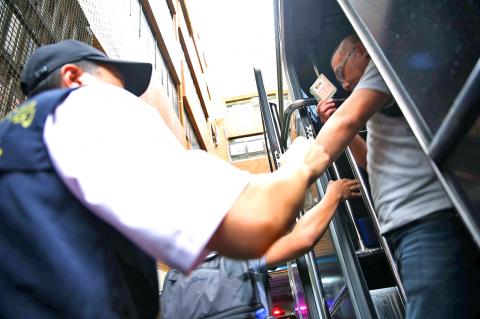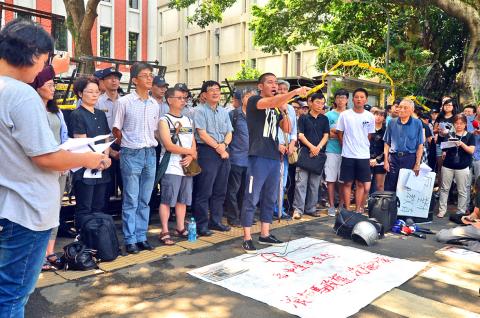Three journalists arrested while covering the storming of Ministry of Education building late on Thursday night and early yesterday morning were released without bail by prosecutors after they insisted on pleading not guilty and refused to accept paying NT$10,000 bail earlier yesterday.
The three reporters arrested are Liao Chen-hui (廖振輝) — a Liberty Times (the Taipei Times’ sister newspaper) photographer, Sung Hsiao-hai (宋小海) of news Web site Coolloud.org.tw (苦勞網) and Lin Yu-yu (林雨佑), a freelance journalist.
All three were inside the ministry building when the students were subdued and arrested.

Photo: CNA
“It was the darkest day of my 19 years of working as a journalist,” Liao said after walking out of the Taipei Prosecutors’ Office last night. “If a government can turn a journalist into a criminal by simply saying: ‘We didn’t invite you to cover the news,’ which media organization would dare to monitor the government’s actions?”
Lin posted a video of police officers grappling for his camera and stating that the reporters had illegally entered the building and did not have any authority to engage in news gathering.
Police reinforcements prevented other members of the media from entering the ministry after news of the break-in emerged.

Photo: Wang Yi-sung, Taipei Times
Despite criticism from the public, as well as from journalist and human rights groups, the ministry insisted on pressing charges against the three journalists.
“The Ministry of Education will withdraw the charges against the three reporters arrested late on Thursday only after determining that they did not participate in breaking into the ministry complex,” Minister of Education Wu Se-hwa (吳思華) said yesterday.
“We hope that the journalists were not a part of this incident,” said Wu, who added that they should be accorded full protection if they were purely engaged in news gathering.
He said that there was a possibility that the reporters had “led” the students into the complex, which would mean that they “participated” in the break-in rather than “reporting on it.”
Ministry of Education Secretary-General Wang Chun-chuan (王俊傑) said all three of the reporters admitted to climbing over the barbed-wire barricades around the ministry building, adding that security camera footage would be analyzed to determine their exact roles.
Students late on Thursday clambered over the barricades and broke into the ministry building, temporarily occupying Wu’s office.
Wang said the decision to arrest the reporters was made by the on-site police commanding officer, while prosecutors would determine whether or not to charge them based on the available evidence.
The ministry would “cooperate” with the decisions of the police and the prosecutors’ office, he said.
Zhongzheng First Police Precinct Deputy Police Chief Lee Chuan-che (李權哲) earlier stated that the reporters had been arrested because the ministry had decided to press charges.
Bailiffs transferred 22 of the 33 individuals arrested for storming the ministry building to the Taipei District Prosecutors’ Office yesterday afternoon for further questioning.
All of those arrested were first taken to the headquarters of Taipei’s special police division for public security in the Songshan District (松山), where many remained yesterday afternoon.
At a separate setting yesterday, human rights lawyer Tseng Wei-kai (曾威凱) said the decision to arrest the journalists was an abuse of power by a government agency and that it infringed upon the right of the media to report the news.
Tseng said police used threats of legal action against those arrested, while confiscating mobile phones so the journalists could not call their employers.
Several rights groups released statements condemning police officers’ use of excessive force against the young students and questionable means used by members of the judiciary.
Taiwan Association for Human Rights legal specialist Hsu Jen-shuo (許仁碩) said that as the owner of the ministry compound, the ministry itself could choose whether or not to charge the students and the journalists for trespass.
Civic organizations also condemned the police officers for abusing their power and excessive use of force when arresting the students and journalists.

CHAOS: Iranians took to the streets playing celebratory music after reports of Khamenei’s death on Saturday, while mourners also gathered in Tehran yesterday Iranian Supreme Leader Ayatollah Ali Khamenei was killed in a major attack on Iran launched by Israel and the US, throwing the future of the Islamic republic into doubt and raising the risk of regional instability. Iranian state television and the state-run IRNA news agency announced the 86-year-old’s death early yesterday. US President Donald Trump said it gave Iranians their “greatest chance” to “take back” their country. The announcements came after a joint US and Israeli aerial bombardment that targeted Iranian military and governmental sites. Trump said the “heavy and pinpoint bombing” would continue through the week or as long

TRUST: The KMT said it respected the US’ timing and considerations, and hoped it would continue to honor its commitments to helping Taiwan bolster its defenses and deterrence US President Donald Trump is delaying a multibillion-dollar arms sale to Taiwan to ensure his visit to Beijing is successful, a New York Times report said. The weapons sales package has stalled in the US Department of State, the report said, citing US officials it did not identify. The White House has told agencies not to push forward ahead of Trump’s meeting with Chinese President Xi Jinping (習近平), it said. The two last month held a phone call to discuss trade and geopolitical flashpoints ahead of the summit. Xi raised the Taiwan issue and urged the US to handle arms sales to

BIG SPENDERS: Foreign investors bought the most Taiwan equities since 2005, signaling confidence that an AI boom would continue to benefit chipmakers Taiwan Semiconductor Manufacturing Co’s (TSMC, 台積電) market capitalization swelled to US$2 trillion for the first time following a 4.25 percent rally in its American depositary receipts (ADR) overnight, putting the world’s biggest contract chipmaker sixth on the list of the world’s biggest companies by market capitalization, just behind Amazon.com Inc. The site CompaniesMarketcap.com ranked TSMC ahead of Saudi Aramco and Meta Platforms Inc. The Taiwanese company’s ADRs on Tuesday surged to US$385.75 on the New York Stock Exchange, as strong demand for artificial intelligence (AI) applications led to chip supply constraints and boost revenue growth to record-breaking levels. Each TSMC ADR represents

State-run CPC Corp, Taiwan (CPC, 台灣中油) yesterday said that it had confirmed on Saturday night with its liquefied natural gas (LNG) and crude oil suppliers that shipments are proceeding as scheduled and that domestic supplies remain unaffected. The CPC yesterday announced the gasoline and diesel prices will rise by NT$0.2 and NT$0.4 per liter, respectively, starting Monday, citing Middle East tensions and blizzards in the eastern United States. CPC also iterated it has been reducing the proportion of crude oil imports from the Middle East and diversifying its supply sources in the past few years in response to geopolitical risks, expanding